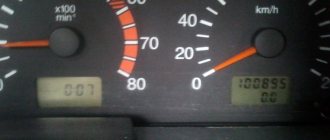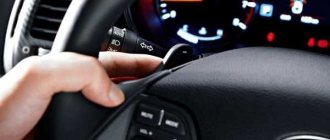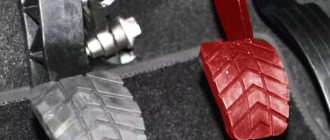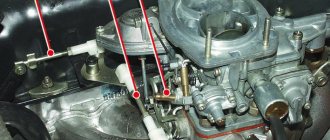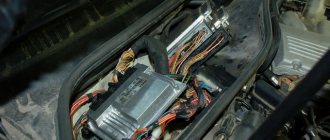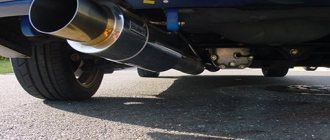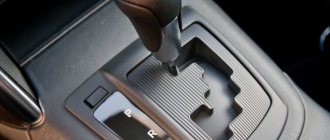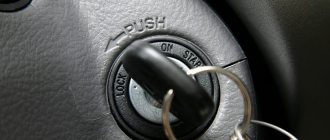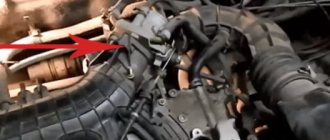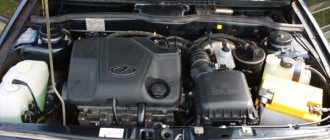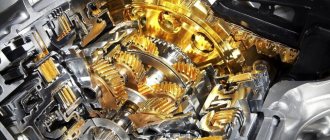The main reason for the car “jerking” when you press the gas pedal
The main reason is most often associated with an oxygen-rich/oxygen-depleted fuel mixture. It is because of the lack of air that the crankshaft continues to rotate despite the fact that the gas pedal has long been released. In addition, when the pedal is pressed sharply, the motor begins to twitch and rotate in place.
The root cause of the problem is preparing the wrong mixture. In turn, the mixture can be supplied to the engine in different proportions due to malfunction of other devices and components of both the engine and the fuel system.
Car jerking due to TPS malfunction
TPS is a special sensor that regulates the position of the throttle valve. It is quite simple to understand that the malfunction is connected with it - the engine begins to “jump” even when the accelerator is gently pressed. The process of jerking is as follows:
- The throttle remains ajar for a long time;
- After this, during acceleration, a faulty throttle position sensor belatedly transmits a signal to the on-board computer of the car;
- As a result, the car’s engine cannot quickly switch from idle to full speed in load mode, after which fuel is supplied in large quantities and sharply into the combustion chamber;
- The result is a sharp decrease in pressure in the fuel rail design. The engine will run jerkily at first, and then completely stall.
This type of malfunction can often be found in vehicles with injection engines. Both domestic cars (Lada Priora, Lada Vesta Cross, Lada Granta) and foreign car models (for example, the same Ford Focus) are not immune from this. In this case, there is only one solution - go to a car service center, where they will replace the faulty sensor.
Advice: do not try to solve the problem yourself by repairing a faulty TPS. As a rule, after repair, a previously faulty mechanism can last no more than 1-2 months.
Car jerking due to a malfunction of the mass air flow sensor
Mass air flow sensor
The second sensor that affects the air supply to the system is a device for regulating the mass flow of oxygen in the system. It works in injection-type engines and is responsible for supplying air during the formation of the fuel mixture. If this component is faulty, then your car will also twitch before it even has time to accelerate. The solution is similar with the first sensor - dismantling and completely replacing the mass air flow sensor.
Car jerking - malfunction in the carburetor chamber and pump
If the engine starts to run jerkily in carburetor cars even when the gas pedal is lightly pressed, the main attention should be focused on the carburetor chamber. The problem is often associated with clogged outlets, which are located in the first of the carburetor chambers.
When the fuel enters the engine, it takes with it some of the soot and metal shavings, as a result of which the mixture undergoes changes and the engine operates unstably. You can solve this problem yourself - just remove the carburetor and blow out all its pipes and holes with compressed air.
A classic example is the following situation: when replacing the front wheel bearing on a VAZ-2109, the pump was damaged. As a result of the failure of the carburetor accelerator pump, the mixture is supplied to the engine in an incomplete volume. The result is the appearance of jerks during even a smooth attempt to move away. In most cases, it seems impractical to repair pumps, which is why they are simply replaced at a car service center.
carburetor chamber
Why does the car jerk when you gently press the accelerator?
- In this situation, the engine responds late to pressing the gas pedal. Jerking occurs when the throttle valve remains open for a long time. At the time of acceleration, the throttle position sensor (TPS) must send a signal to the electronic control unit (ECU) that the engine is switching from idle to load mode, therefore, more fuel must be supplied to the combustion chambers, and the total pressure in the fuel rail must be high. If the TPS is faulty, it does not send the above signal to the ECU (or it does, but with a delay). As a result, the pressure in the ramp drops, the engine begins to twitch, and sometimes stalls. This malfunction occurs in injection engines, both in domestic cars (Lada Priora, Lada Granta) and in foreign cars (in particular, Ford Focus 2). The solution is obvious: you need to replace the faulty sensor.
- The same problem in fuel-injected cars can be created by the mass air flow sensor (MAF). He monitors the formation of the mixture and how much air enters it. If it is faulty, the car will start to twitch before it has time to accelerate. This means that the mass air flow sensor should also be replaced.
- In carburetor cars (VAZ 2107, the first rare release of the VAZ 2114), jerks during acceleration occur due to clogging of the outlet holes in the first carburetor chamber. Solution: the carburetor is removed and blown out with compressed air.
- In classic VAZ models, carburetor accelerator pumps often fail, and this also causes jerking when trying to move away. It is impractical to repair this part, so it should be replaced.
The appearance of jerking in the car when you sharply press the gas
If the cause is not related to the fuel pump, then these symptoms may indicate the so-called “triple” of the engine. A situation arises in a car in which out of 4 cylinders only one can work correctly. As a result of the “triple”, the engine simply cannot respond in time to pressing the gas pedal, after which similar problems arise. You can deal with the breakdown in the following ways:
- If the oxygen supply sensor is not working properly, the system is diagnosed using a multimeter. If any faults are found, it is simply replaced.
- If the valve timing in the engine is shifted, it is necessary, with the help of car service specialists, to adjust them according to the appropriate instructions.
- Detection of an incorrect glow number of spark plugs is resolved by installing a new set with the correct number.
- The problem of clogged injectors can only be solved at a car service center. To do this, they are installed on a special stand, which simulates the operation of a motor, and washed with a special solvent.
- The problem can also arise if the emulsion tube and well located in the design of the second chamber of the carburetor engine are clogged. The only solution here is to flush the carburetor and pipe with kerosene.
Causes of overclocking failure
You can determine the reason why the car jerks and stalls using diagnostics. Possible problems:
- Malfunction of the fuel supply system;
- Damage to engine temperature and mixture enrichment sensors;
- Errors in the ECU;
- Faulty spark plugs;
- Damage to high-voltage wires or ignition coils;
- Clogged or faulty injectors:
On HBO, the problem may arise due to:
- Faulty HBO control unit;
- There is interference in the harness to which the fuel injectors are connected;
- Gas wiring;
- Bad mass.
Engine jerking due to problems with the ignition system
If, when the car picks up speed, you observe sharp drops in power, then the reason lies in malfunctions of the ignition system elements. This problem applies to any type of engine. The only correct solution is to check the ignition with the engine turned off. It is carried out by the following signs:
- The tightness of the pads with the wires is checked;
- No chips and good condition of the reel;
- The wiring connecting the ignition system to the engine is in good condition.
After checking all the elements, you need to start the car and just listen to how the engine began to work. If you notice the appearance of characteristic clicks, it means that there are small breakdowns in the system with high voltage. In this case, you will have to buy all the elements of the ignition system - a coil, a block and a set of high-voltage wires.
Tip: Do not try to replace the wiring on your car yourself. Only highly qualified specialists can, using instructions and diagrams, correctly connect relays and fuses, after which the ignition system will not burn out. You can also check the wheels at the same time by checking the car tire pressure table.
If the engine runs smoothly, the problem may lie in the spark plugs. And to put it more precisely - in the absence or rare appearance of a spark. The presence of defects in the spark generation system can be easily detected if the car engine starts to run jerkily when descending from hills and even on flat sections of the road.
For example, a problem with a set of spark plugs is typical for vehicles under the Nissan brand. This is due to the equipping of their SA-18 model engine with a special non-contact distributor design. The distributor housing contains a switch, if it malfunctions, the spark signal does not arrive at the on-board computer, and such a specific movement of the machine occurs. Motor jerking can be corrected only by completely replacing the distributor components.
If the set of spark plugs is in excellent condition, the only remaining cause may be a malfunction in the operation of the carburetor-type engine control unit. In this case, jerks do not occur constantly, but randomly and only during a long drive of the car.
It is possible to detect faults in the control unit only after diagnostics in a car service center on a special stand. Also, with the help of a lift, you will be able to see that the car twitches occasionally when idling. As a result, the control unit (EFI) should be replaced along with faults found in other components of the vehicle.
car pads
How to fix overclocking failures
- Check the ignition wires and coils. When a breakdown occurs, the spark plug wires spark and glow in the dark. The engine shakes and jerks. This happens due to age, poor quality parts or poor contact with the spark plugs. The malfunction may be related to the engine temperature. The interwinding resistance of the coils and the thermal operating conditions change together, which is why a gasoline car jerks during acceleration. If you have a diesel engine, jerks during acceleration are definitely not related to the operation of the coils, they are not there.
- Inspect the spark plugs. Poor contact with the wires, heavy carbon deposits, too lean or rich fuel mixture disable them. Unscrew and check each spark plug as in our article “Diagnostics of internal combustion engine operation using spark plugs,” where we gave examples of faulty spark plugs.
- Check the fuel, oil and air filters. Over time, they become clogged, which leads to deterioration in dynamics, increased fuel consumption and periodic failures. You can replace them yourself; they are inexpensive and easy to install.
If the tips above did not help, only diagnostics will solve the reason for this behavior of the gas pedal. Incorrect operation of systems, errors, composition of the fuel mixture - the diagnostician will name a specific malfunction.
Even if the engine is working properly, the car may move jerkily when accelerating. Motors that meet environmental standards Euro-4 and higher have this unpleasant property. The point is the reaction of the electronic throttle to pressing the gas pedal. It is nonlinear for the first 3–4 centimeters of travel. Because of this, failure may occur during overclocking.
Chip tuning to Euro-2 or Euro-0 standards improves the response of the gas pedal and solves the problem. ECU firmware has a number of other advantages:
- Improves overall dynamics, idle performance and traction at low speeds;
- The car does not stall when the air conditioning is on;
- Gear shifts smoother;
- Fuel consumption is reduced while maintaining driving style.
Video from our partner on how chip tuning copes with failures during acceleration and “brooding” of the accelerator pedal on Gazelle Next:
Contact ADACT partners in your city for chip tuning. We guarantee a 10-day test drive, money back and replacement if you don't like the firmware.
Where to do chip tuning
